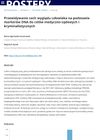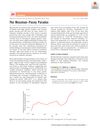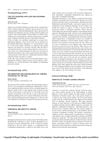 July 2022 in “Postepy biochemii”
July 2022 in “Postepy biochemii” DNA markers can predict physical traits for forensic use, but there are ethical and technical challenges.
 December 2021 in “The Journal of clinical endocrinology and metabolism/Journal of clinical endocrinology & metabolism”
December 2021 in “The Journal of clinical endocrinology and metabolism/Journal of clinical endocrinology & metabolism” Men can have genetic risks for PCOS-related traits like obesity and diabetes.
December 2003 in “The journal of investigative dermatology/Journal of investigative dermatology” Glycerol may improve wound healing and prevent keloids, a device can measure itch intensity, male pattern baldness is highly heritable, and fumaric acid esters may work for psoriasis by causing cell death in T cells.
[object Object] January 2021 in “Przegla̧d dermatologiczny” Women know more about androgenetic alopecia than men.
November 2022 in “Journal of Investigative Dermatology” Rare genetic variants in 125 genes are linked to male-pattern hair loss.
 2 citations,
May 2021 in “Journal of the Endocrine Society”
2 citations,
May 2021 in “Journal of the Endocrine Society” Men with high genetic risk for Polycystic Ovary Syndrome (PCOS) have increased chances of obesity, type 2 diabetes, heart disease, and hair loss, showing PCOS risk factors can affect both genders.
1 citations,
June 2022 in “Journal of Cosmetic Dermatology” Two specific genetic markers increase the risk of hair loss in Asian populations.
 February 2011 in “Journal of Clinical Investigation”
February 2011 in “Journal of Clinical Investigation” Genetically repaired stem cells may treat certain genetic diseases, Th17 cells are key in fighting systemic fungal infections, hair loss in AGA is due to progenitor cell loss, and α-synuclein transfer might contribute to Parkinson's disease progression.
 July 2019 in “Journal of Investigative Dermatology”
July 2019 in “Journal of Investigative Dermatology” The research found that male pattern hair loss is mostly genetic and involves hair thinning due to hormonal effects and changes in gene expression.
21 citations,
January 2010 in “International journal of trichology” Trichoscopy can diagnose monilethrix, a genetic hair defect causing hair thinning and loss.
 15 citations,
February 2017 in “International Journal of Women's Dermatology”
15 citations,
February 2017 in “International Journal of Women's Dermatology” Hair aging and loss are caused by genetics, hormones, environment, and grooming, with treatments like minoxidil effective for certain types of hair loss.
5 citations,
January 2016 in “Open Journal of Regenerative Medicine” Myoblast transplantation shows promise for treating various muscle and heart conditions.
May 2011 in “Harper's Textbook of Pediatric Dermatology” Alopecia areata causes patchy hair loss and has no cure, but treatments like corticosteroids and minoxidil can help.
 November 2005 in “Journal of Investigative Dermatology Symposium Proceedings”
November 2005 in “Journal of Investigative Dermatology Symposium Proceedings” The 2004 hair research meeting presented new findings on hair cell differentiation, genetic factors in hair loss, hair pigmentation, and potential targeted therapies.
 68 citations,
March 1965 in “The BMJ”
68 citations,
March 1965 in “The BMJ” Hormones and genetics affect hair growth and patterns, with some changes reversible and others not.
 60 citations,
September 2001 in “Journal of the American Academy of Dermatology”
60 citations,
September 2001 in “Journal of the American Academy of Dermatology” Insulin resistance contributes to hormone imbalances in many women with polycystic ovary syndrome.
 50 citations,
July 2000 in “Dermatologic Surgery”
50 citations,
July 2000 in “Dermatologic Surgery” Female and male AGA are different diseases.
5 citations,
January 2020 in “Research journal of pharmacy and technology” CBD may help reduce stress and pain in women with PCOS.
 2 citations,
April 2019 in “Journal of Internal Medicine”
2 citations,
April 2019 in “Journal of Internal Medicine” Men using steroids or finasteride to look more attractive may harm their fertility and sexual function, creating a paradox where they seem fit but may be less able to reproduce.
 January 2024 in “Zenodo (CERN European Organization for Nuclear Research)”
January 2024 in “Zenodo (CERN European Organization for Nuclear Research)” The conclusion is that certain traits, including perceived facial aging and BMI, are linked to perceived youthfulness differently in men and women.
 January 2024 in “Zenodo (CERN European Organization for Nuclear Research)”
January 2024 in “Zenodo (CERN European Organization for Nuclear Research)” The conclusion is that certain traits, including perceived facial aging and BMI, are linked to how youthful people look, with some differences between males and females.
 March 2021 in “CRC Press eBooks”
March 2021 in “CRC Press eBooks” Hair loss without scarring is more common than permanent hair loss with scarring, and is often due to genetic factors.
 January 2014 in “Pathology”
January 2014 in “Pathology” The document concludes that understanding nail anatomy is key for diagnosing nail diseases, early signs of nail melanoma may allow for less aggressive treatment, and specific genetic mutations are important in thyroid cancer prognosis and treatment.
 June 2018 in “Advances in Cosmetic Surgery”
June 2018 in “Advances in Cosmetic Surgery” Hair loss caused by genetics and hormones; more research needed for treatments.
 8 citations,
July 2012 in “Cambridge University Press eBooks”
8 citations,
July 2012 in “Cambridge University Press eBooks” Androgens can both increase body hair and cause scalp hair loss.
[object Object]  4 citations,
January 2002 in “Annals of Dermatology”
4 citations,
January 2002 in “Annals of Dermatology” Androgenetic alopecia, or hair loss, is most common in people in their 30s, can start early, is often inherited, and may be influenced by factors like hormones and scalp health.
 1 citations,
June 2019 in “Innovare journal of medical sciences”
1 citations,
June 2019 in “Innovare journal of medical sciences” Polycystic Ovary Syndrome (PCOS) is a hormonal disorder in women that can cause infertility and other health issues, and it may be improved by treatments that increase insulin sensitivity.
 May 2023 in “International Journal of Home Science”
May 2023 in “International Journal of Home Science” PCOS is linked to metabolic issues and infertility, needing more research.
 December 2022 in “IntechOpen eBooks”
December 2022 in “IntechOpen eBooks” Forensic DNA Phenotyping accurately predicts physical traits and is used in investigations, but needs more diverse population data for confirmation.
 August 2022 in “Gene Reports”
August 2022 in “Gene Reports” New hair loss treatments could be improved by using combined biological markers.






















